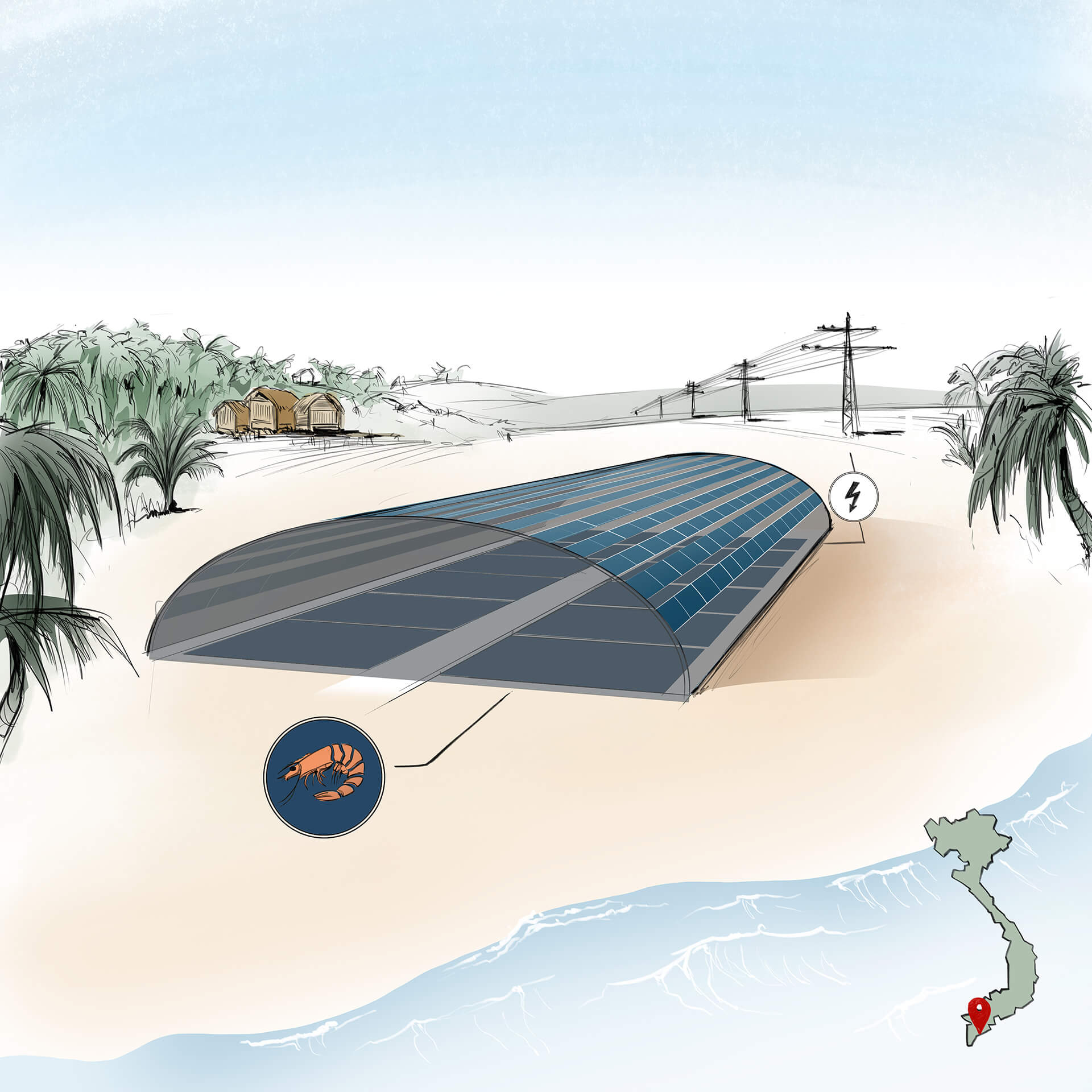| Duration: | 08/2019 - 05/2023 |
| Contracting Authority/ Sponsors: | CLIENT II – International Partnerships for Sustainable Innovation (in the framework programme), Research for Sustainable Development (FONA3), German Federal Ministry of Education and Research (BMBF) |
| Project Partners: | SMA Sunbelt Energy GmbH, Can Tho University, Nong Lam University, Deutsche Gesellschaft für Internationale Zusammenarbeit (GIZ) GmbH, Institute of Energy, Suntrace GmbH, Johann Heinrich Thünen-Institute (German Federal Research Institute for rural Areas Forestry and Fisheries), Viet Uc Seafood Group, Department of Agriculture and Rural Development of Bac Lieu province, People’s Council – People’s Committee of Bac Lieu |
| Website: | https://agri-pv.org/en/ |
| Project Focus: |
SHRIMPS – Solar-Aquaculture Habitats as Resource-Efficient and Integrated Multilayer Production Systems
The aim of the SHRIPMS project is to demonstrate the technical and economic feasibility of dual land use for solar power generation and aquaculture in pond farming. Together with local pangasius and shrimp breeders, the project partners are investigating synergies and interactions between the two levels in an interdisciplinary approach. Based on innovative and shadow-tolerant breeding methods for pangasius and shrimp, researchers and industrial partners from Vietnam and Germany are jointly developing a concept for an integrated, ecologically and economically sustainable aquaculture photovoltaic system that promotes the expansion of renewable energies (RE) without taking up additional land.
The SHRIMPS project unites aquaculture research and solar energy expertise to reveal challenges and opportunities of a PV-shrimp system and to gain a deeper understanding of synergies and interactions between both layers. The SHRIMPS partners intend to develop a concept of a PV-shrimps production system, establishing aquavoltaics as a further dual land use management system that raises overall productivity of land, reduces water consumption and wastewater outflow, mitigates CO2-emissions, promotes adaptation strategies to climate change, fosters economic situation of rural areas in Mekong Delta, contributes to more security of energy supply, supports sustainable shrimp production technologies and establishes a platform for international and interdisciplinary knowledge transfer.
The rollout of the technology is being prepared by installing a pilot plant in the Mekong Delta, integrating the concept into a business model for small and medium sized farms and developing an investment strategy. Utilization of research results is ensured by the high level of interest shown by Vietnamese authorities, companies and municipalities and their strong involvement from the onset. The project partner will elaborate technical solutions to adjust both layers to each other, to optimize overall productivity, and to realize a high degree of integration taking into account political, social and economic framework conditions. An installation of a pilot plant in the Mekong Delta at the facility site of the seafood company Viet Uc in Bac Lieu province shall serve as a visible demonstration of the system’s technical viability. The project partners will develop a concept of a rollout in the Mekong Delta evaluating different application areas with respect to size, region, grid connection, grid stability and other relevant conditions, and assess respective upscale and market potentials. Focus of the rollout strategy is an integration of the system into a bankable business case for small and medium size aqua-farming units in order to ensure a socio-economic sustainable diffusion and further utilization of the technology after the project period.
More Info
- Press Release 2018 concerning the project (ise.fraunhofer.de)
